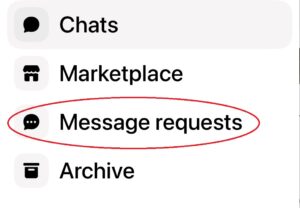Research shows that the average person spends about 147 minutes a day (nearly three hours!) on social media. You know who else is out there just as much as you are? Scammers—and they’re constantly looking for ways to trick you out of money or information.
If you think it won’t happen to you, think again.
In 2021, people reported about $770 million in losses to fraud initiated on social media. That’s 25% of ALL reported fraud losses and you’re not immune if you’re of a younger generation. People 18 to 29 years old were twice as likely than older adults to lose money in social media scams.
To stay safe, you need to think on your feet and be a little wary—even over private message. If you get an unexpected new message or message request from a friend on Facebook friend, be warned: It may not be on the up and up.
How it works
You get a note over Facebook Messenger that seems to be from a friend because the name and profile photo all look right. That person starts by asking an innocuous question like, “Hi, how are you?” or “Is this you?” Sometimes you could even get a message from a “friend” saying you won money.
Regardless of the approach, the idea is to fool you into responding by building off the trust you have with your friend.
Many of these messages contain a link—and if you respond to the message just saying hello you’ll likely find the conversation quickly turns to something money related. For example, the person might tell you they just got a huge grant and encourage you to apply by filling out an online form.
In reality, you’ve gotten the request from a scammer who has hacked a real friend’s account, or they’ve set up a new spoofed profile that only looks legitimate. Because these messages can seem so real, you need to be on your toes to stay safe.
How to protect yourself
Consumer Reports and AARP have suggestions for how to stay safe. We’re summarizing key tips in one place:
- Don’t click on the links or open attachments. Attachments and links can download malware onto your computer that can compromise your device in a variety of ways, including recording every keystroke.
- Use common sense. Real friends would never ask you for your financial information, credit card numbers, or request wire transfers—and think about it: If a friend actually needed money or thought they had a great opportunity for you, would they contact you randomly over Facebook? Probably not. Instead, they’d call you or see you in person to explain.
- Be wary of urgency. Scammers try to get past your common sense by trying to keep you from thinking about it—they just want you to react to their “urgent” request. Don’t fall for it. If you think the request could be legitimate, call your friend and speak with them.
- Bad grammar can be a tip off … or not. Of course, none of us are perfect—but oftentimes misspellings, awkward phrasing, or bad grammar can be signs of a con artist. This said, with the advancement of artificial intelligence bots, it’s getting harder to tell. If something just doesn’t feel quite right, listen to that gut feeling.
- Protect your own account. Hackers can’t trick your friends by stealing your identity if your account is safe. Set up two-factor authentication and make sure your passwords are strong.
 One more tip from this author: If you get a message request from someone appearing to be an existing Facebook friend, you should immediately be suspicious. Why? Because a real Facebook friend wouldn’t need to send a message request. Facebook allows connected friends to chat over Messenger without that step. The only time you see a request is when you’re not friends already (which means it’s likely a fake account!).
One more tip from this author: If you get a message request from someone appearing to be an existing Facebook friend, you should immediately be suspicious. Why? Because a real Facebook friend wouldn’t need to send a message request. Facebook allows connected friends to chat over Messenger without that step. The only time you see a request is when you’re not friends already (which means it’s likely a fake account!).

No comments yet.